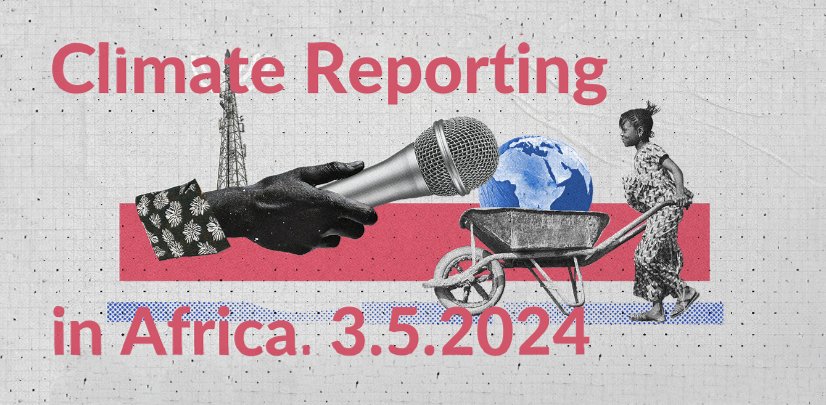
T_ClimateConference

Climate change reporting in Africa
Discover how climate change impacts Africa and how African journalists are covering it! Join us in Berlin on World Press Day, May 3, 2024. Registration and further Information here. Africa is home to about 18% of the global population, but only accounts for less than 5% of cumulative greenhouse gas emissions.
Discover how climate change impacts Africa and how African journalists are covering it! Join us in Berlin on World Press Day, May 3, 2024. Registration and further Information here.
The conference is hybrid. To join in Berlin please register here: https://www.eventbrite.com/e/climate-reporting-in-africa-tickets-883390202877
and online here: https://us02web.zoom.us/webinar/register/WN_cmSbmwPyStq5xEzNOUmugw
Background: Africa is home to about 18% of the global population, but only accounts for less than 5% of cumulative greenhouse gas emissions. Despite Africa’s relatively low contribution to greenhouse gas emissions, the IPCC’s 6th Assessment Report on impacts, adaptation, and vulnerabilities confirmed that Africa is emerging as the world’s epicenter of climate vulnerability and risks, with 9 out of the 10 countries most vulnerable and least resilient to climate change countries located in the continent .
Climate change reporting in Africa
Against this background the role of media is to inform the public, explain scientific concepts, humanize climate change, highlight solutions,support policy makers and the public to navigate challenges and take advantage of available solutions, as well as hold powerful actors to account, though for example, investigative journalism is extremely urgent. Yet, there is a defining shortage of media coverage on climate change from both local and international journalists.
While the scale of climate reporting is indeed improving in Africa, another critical aspect of climate reporting in Africa is who tells, and how the story is told. In other words, how the climate narratives are framed and communicated in Africa and abroad. This is important because how Africa's climate story is told can have significant implications on various levels, such as shaping public perceptions, local and global policies, international collaborations and partnerships, global solidarity and climate justice action. This underscores the need to prepare and equip African and Global journalists alike with the capacity and tools they need to provide contractive, fact based, and impactful reporting on climate change without fear or favor and without stripping Africans of their humanity and dignity.
Speakers:
Opening Speach:
Vanessa Nakate, Uganda (Author of A Bigger Picture)
Our speakers are Journalists from various countrie such as:
Justice Baidoo, Ghana. (BBC World Service, France 24, Los Angeles Time, Reuters)
Mouhamadou Touré, Mali (Studio Tamami, Studio Kalangou in Niger, Studio Yafa in Burkina
Faso, Radio Bamakan and Radio Voix des Jeunes in Mali.)
Afy Bobyondo Malungu, Democratic Republic of Congo (DRC). (Founder and editor of Africa Reveal, and a contributor and a former French editor of InfoCongo, an EJN geo journalism platform focused on the Congo Basin region.)
Mary Kasoka, Zambia.
Happy Mulolani, Zambia. (National Agricultural Information Services (NAIS))
Bernard Mwinzi, Kenya. (Managing Editor, Content Hubs at the Nation Media Group)
KRA Akissi Marthe Bénédicte, Côte Ivoire. (Eco-Reportages World Prize, Norbert Zongo African Prize, Best science journalist in Côte Ivoire)
Andiswa Matikinca, South Africa (Oxpeckers Center for Investigative Environmental Journalism)
John Douglas Mutumba, Uganda (CREAM - Climate Reporting in East African Media, EARS)
Banna Sabally, The Gambia (West Coast Radio, The NAM Podcast)
The conference is realised with the support of the Federal Ministry for Economic Cooperation and Development, as well as the Stiftung Mercator, the German Development Cooperation (GIZ) and the Friedrich- Ebert Foundation.
About us:
The program is hosted by Media in Cooperation and Transition (MiCT) together with Africa Policy Research Institute (APRI)and Angelina Davydova, a renowned climate journalist who is also a member of the World Future Council and has been an observer in the UN Climate Change negotiation process since 2008.
Contact: Nyima Jadama, jadama@mict-international.org
The program is hosted together with Angelina Davydova, a renowned climate journalist who is also a member of the World Future Council and has been an observer in the UN Climate Change negotiation process since 2008.
MiCT has collaborated with initiatives like the Blue Peace Initiative and the Nile Basin Initiative, as well as with JESE – Joint Effort to Save the Environment in Uganda. These partnerships are instrumental in addressing the multifaceted aspects of increasing environmental challenges. The Blue Peace Initiative focuses on fostering cooperative approaches to water resource management to promote peace and sustainability in Jordan, Palestine, Syria, and Iraq. MiCT also works with The Nile Basin Initiative to cover the development of crucial water resources for the ecological and economic well-being of the Nile Basin region. We also supported local radio stations to broadcast programs about farming innovation in Burkina Faso. MiCT is currently launching a new initiative in East Africa to network experts and support radio stations to produce programs on climate and environmental issues.www.khatt30.org regularly publishes articles about climate and the environment
